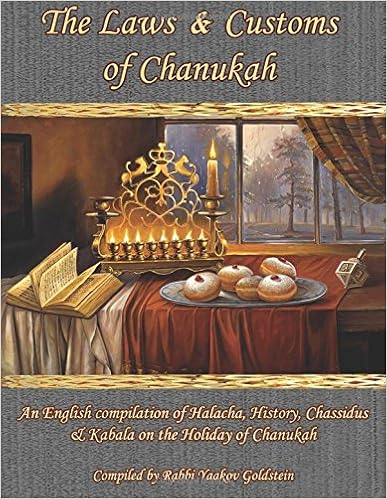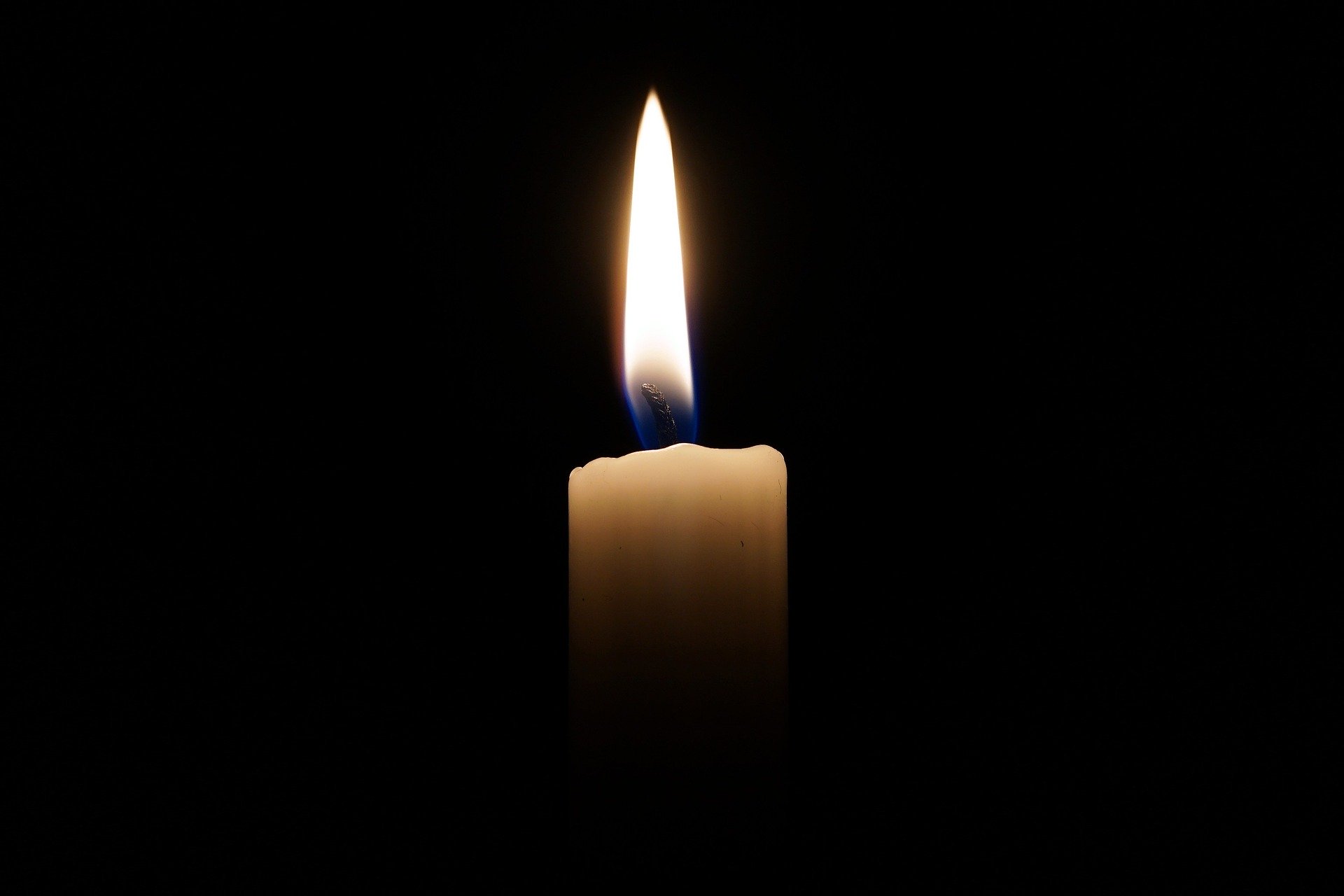

To purchase this Sefer, click here
Hallel:[1]
Each day of Chanukah one recites the complete Hallel.[2]
Kaddish after Hallel:[3] After reciting Hallel, half Kaddish is recited.[4] On Rosh Chodesh Teves, the complete Kaddish is followed after Hallel. This is then followed by the Torah reading.
Hallel in the house of a mourner within Shiva:[5] On Chanukah, Hallel is recited in the house of the Avel just as it is recited in Shul.[6] Even the mourner is to recite Hallel.[7]
Davening for the Amud on Chanukah:[8] The custom is that a mourner [within 12 months of a parent] Davens for the Amud during Chanukah although he does not lead the Hallel prayer for the congregation.[9] [He is however to say the Kaddish after Hallel.[10]]
Q&A
May one who has a Yartzite on Chanukah lead the Hallel?
Yes.[11]
If one forgot to say the blessing over Hallel and remembered in the middle, what is he to do?[12]
He is to stop in middle and recite the blessing and then continue from where he left off.
Are women obligated to recite Hallel on Chanukah?
Some Poskim[13] rule women are obligated to recite Hallel on Chanukah.[14] Other Poskim[15] rule women are obligated to recite Hallel on Chanukah.[16] Practically, it is proper for women to recite Hallel and hence fulfill their obligation according to all opinions.[17] Women of Ashkenazi origin are to say a blessing over Hallel.[18]
__________________________________________
[1] Michaber 683:1; Erechin 10
[2] The reason: As on each day of Chanukah a new miracle occurred. Alternatively, as on each day we light a different number of candles. Alternatively, as each day corresponds to the Karbanos that we read from the Torah during Chanukah, and each day there was a different set of Karbanos. [Beis Yosef; Levush; M”B 683:1; Kaf Hachaim 683:1]
[3] Siddur Admur; Levush 683; M”B 683:1; Kaf Hachaim 683:2
[4] The reason: As a full Kaddish will be recited after Uva Letziyon. This is opposed to when Hallel is recited on Rosh Chodesh or Chol Hamoed, Shabbos, or Yom Tov in which there is no full Kaddish which follows Uva Letziyon and thus the full Kaddish is recited immediately after Halel. [See Levush ibid; Shaar Hakolel 11:22]
[5] Admur 131:5 in parentheses; M”A 131:10 in name of Tanya 68; Elya Raba 131:9; Chida Machazik Bracha 683; Siddur Yaavetz; Tehila Ledavid 131; Kaf Hachaim 683:4 and 131:61; Sefer Haminhagim p. 161; Yabia Omer 4:33; Piskeiy Teshuvos 683:3; See M”B 683:1
Other opinions: Some Poskim rule that Hallel is not to be recited in the house of an Avel. [Peri Chadash 422:2; Maharil Chanukah; M”A ibid writes to say it at home; Poskim brought in Kaf Hachaim 131:61]
[6] The reason: The law of skipping Hallel in the house of an Avel only applies by Hallel said on Rosh Chodesh, being that its obligation is merely due to custom. However, on Chanukah, in which Hallel is said as an obligation due to Rabbinical decree, it is recited even in the mourners home, as even the mourner himself is obligated to recite it. [Admur ibid]
[7] Admur ibid “even the mourner himself is obligated to recite it “; Kaf Hachaim 683:4; Poskim in Piskeiy Teshuvos 683:3 footnote 10; See Gesher Hachaim 20:3
Other opinions: Some Poskim rule that the Avel himself is not to recite it. [Chayeh Adam 154:40; M”B 683:1]
[8] Admur 131:5; Maharil 22; Elya Raba 582:22; Gilyon Maharsha 376:4 in name of Kneses Hagedola 391; M”B 581:7 in name of Machatzis Hashekel; Gesher Hachaim 23:5; Sefer Haminhagim p. 161 [English]; Igros Kodesh 2:324; 8:236; 11:3; 24:149 [published in Shulchan Menachem 5:303-304]; See Maharam Shick 183; Poskim in Nitei Gavriel 58:1; Piskeiy Teshuvos 683:2
Other opinions: Some Poskim rule a mourner is not to lead the prayers of Shacharis during Chanukah, but may lead the prayers of Mincha and Maariv. [P”M 683 M”Z 1; M”B 683:1; 671:44 based on P”M; 581:7 in name of Gr”a; Kaf Hachaim 683:5; Maharam Shick 183 in name of Chasam Sofer; Aruch Hashulchan Y.D. 376:14; Dvar Moshe 84 that so is custom of Chassidim;] Some are accustomed that mourners do not Daven for the Amud at all on Chanukah. [See Divrei Yatziv Y.D 236 based on Ramak; Implication of Shut Mahril 22; Mahram Mintz 43; Noam Megadim p. 43; Yad Sofer 37 in name of Chasam Sofer; M”B 132 “Kuntrus Mamar Kaddeishim”; Piskeiy Teshuvos ibid that so is custom in majority of Chassidic communities; Rivivos Efraim 1:443 in name of Rav Moshe Feinstein; See Piskeiy Teshuvos 132:31]
[9] The reason: The congregation is found in a state of joy during this time similar to the custom on Shabbos and Yom Tov [and it is hence improper for the Avel to lead the prayers]. [Admur ibid; Maharil ibid; Elya Raba ibid]
[10] Hiskashrus 908 p. 15
[11] The reason: As the above law only applies to an Avel which has a status of mourning and is thus not to lead the prayers on Shabbos and Yom Tov. This does not apply by one who has a Yartzite.
[12] Birkeiy Yosef 683:1; Kaf Hachaim 683:3
[13] Minchas Pitim 683; Hisorerus Teshuvah 1:51; Shevet Halevi 1:205; Based on Tosafos Sukkah 38a
[14] The reason: As also women were included in the miracle, and hence they too are obligated to sing praise to Hashem. [ibid]
[15] Beis Shearim 359; Sdei Chemed Chanukah 9 in name of Binyan Shlomo; Yabia Omer 6:45; based on Rambam Chanukah 3:14
[16] The reason: As it is a Mitzvah Shehazman Grama of which women are exempt. [ibid]
[17] Piskeiy Teshuvos 683:1; Moadim Uzmanim 2:146
[18] See Piskeiy Teshuvos 683 footnote 4



Leave A Comment?
You must be logged in to post a comment.